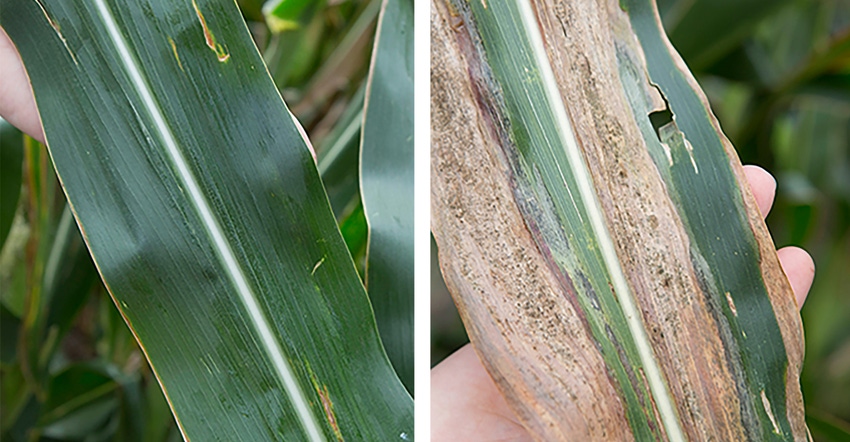
There is a new term in the seed corn industry for 2017. Dekalb trademarked the term Disease Shield for brand-new genetics that combine high-yield performance with superior disease resistance to key corn diseases.
Jared Webb, Dekalb product development manager, says Disease Shield signifies a group of hybrids released for 2017 with good yield potential and very good resistance to specific diseases that tend to impact corn the most. DeKalb Disease Shield isn’t a specific trait, he notes. Instead, it’s a designation for new genetics that measure up to highs standards for disease control.
“Naturally, plant breeders paid a lot of attention to yield potential,” Webb says. “But they placed special focus on disease resistance as well. Hybrids that carry this designation have very good resistance against some of the most troublesome diseases in corn.”
Tough diseases
The specific diseases that Disease Shield hybrids possess good resistance against include anthracnose stalk rot, Goss’s wilt, northern corn leaf blight and gray leaf spot. In addition, hybrids that would be planted in more southern geographies in the U.S. also have resistance to southern rust.
“Part of the problem is that growers don’t know which disease will be the biggest problem in any one year,” Webb says. “The goal with Disease Shield hybrids is to minimize risk by providing hybrids with good resistance against the most common tough diseases which will likely appear in their area at some point in the future.”
Up to six new Disease Shield hybrids are available for 2017, depending on where you farm. They range from 109 to 120 days in maturity, Webb notes. Growers in southern areas will likely lean toward fuller-season hybrids. Farmers in Michigan, for example, could access 109- or 114-day hybrids.
Northern corn leaf blight tends to be a bigger issue in cooler summers. Gray leaf spot, favored by warmer, moist conditions, was a big problem late in 2016 in some areas. Southern parts of Indiana, Ohio and Illinois saw southern rust in 2016. It devastated susceptible hybrids.
Test results
Disease Shield hybrids available for planting in 2017 were tested extensively across the Corn Belt in 2016, Webb says. In fact, they went up against competitive hybrids in 1,400 plots nationwide. The average yield advantage vs. the competition in 2016 nationally was just over 12 bushels per acre, Webb reports.
Just because Dekalb introduces Disease Shield hybrids doesn’t mean there aren’t hybrids in the existing lineup with good resistance, Webb emphasizes. He recommends working with your seed sales representative to select the best hybrids for your farm.
Dekalb rates disease resistance in its seed books on a 1 to 9 scale, with 1 being the best, Webb says. In general, hybrids rating from 1 to 3 are considered strongly resistant.
“It varies some by disease,” he says. “Hybrids rated at 4 for gray leaf spot still have strong resistance. We inoculate some plots with gray leaf spot, and there can be intense pressure. Susceptible hybrids in those situations may rate an 8.”
Check with your Dekalb dealer for more information on Disease Shield hybrids.
About the Author(s)
You May Also Like




